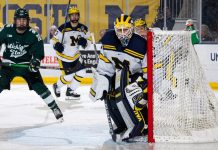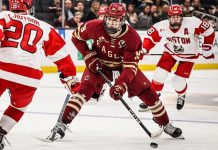On this hallowed ground
Milwaukee’s Bradley Center is just a building. Seats nearly 18,000 for hockey, pretty nice-looking from the outside, has received a facelift on the inside.
But, oh, the memories. Like that one weekend back in 1997 when North Dakota breezed past Colorado College and held off Boston University to win the national championship.
Like that Saturday night in 1998 when UND’s Jason Blake had the puck on his stick near the top of the crease with only Wisconsin goaltender Graham Melanson standing between him and the game-tying goal in the dying seconds of the Western Collegiate Hockey Association Final Five championship.
Melanson won. So did the Badgers.
Like that March day in 1996, when Nick Checco broke the Badgers’ hearts with an overtime goal that sent Minnesota to the Final Five title game. Handpass? Maybe. Long gone? Definitely.
The Bradley Center is not new to either Wisconsin or North Dakota. So when they are expected to meet for the Badger Hockey Showdown championship on Tuesday, there will be some excitement.
But, alas, I’m getting ahead of myself. With all due respect to the Central Collegiate Hockey Association, with the Sioux playing Miami and the Badgers taking on Nebraska-Omaha … well, let’s just say whoever planned the tournament was probably hoping for a UW-UND final.
That could be the shot in the arm this tournament needs. Not that the Showdown isn’t a good draw for teams — Wisconsin coach Jeff Sauer often reports teams beating down his door to play in Milwaukee — but that the Milwaukee market could stand to see some excitement on the ice.
Attendance has largely been on the decline since 1992, the year after the Badgers last made it to the Frozen Four. That year, the tourney drew a record 35,382 fans — 17,633 on the first night and 17,749 for the championship.
Last year, attendance sank to an all-time low — 19,814 for the two days, including only 9,252 for the championship.
Finding something to blame isn’t too difficult. Two things come to mind off the top of one’s head, in no particular order. One of them is the success of the Wisconsin football team. Pasadena is a lot better place to be at the end of December than Milwaukee. I can say that because I lived in Milwaukee for the majority of my life.
The other reason is the relative lack of success for the hockey Badgers. Since that 1992 tournament, when BU beat Wisconsin 6-3 in the final (the only Showdown championship game UW has lost) the Badgers have appeared in only three of the six championship games.
Wisconsin officials are hoping this year will bring some interest back into the tournament. A potential matchup of two of the top four teams in the nation in the championship could do the trick.
If it happens…
And what a matchup that has the possibility of being. The Sioux and the Badgers have been unable to create much distance between one another thus far in the season. When Wisconsin loses, North Dakota loses. If not for UW’s loss to Alaska-Anchorage and UND’s loss to Denver on Dec. 11, the teams probably would have been 1-2 in the rankings. That’s the way it’s been.
But unless the teams don’t meet in the tournament, there’s no way to avoid one of these teams getting ahead of the other.
And it could go a long way in establishing one of the teams as a true NCAA title contender. North Dakota has only played one team that can be considered in that category, and lost (to New Hampshire on Nov. 28). Wisconsin beat Michigan State but lost to Michigan. A win against a top team never looks bad.
And for the Badgers, it’s one of the team’s five goals for the season, according to Sauer.
"There’s a number of goals that we set for the season," Sauer said. "No. 1 was to win the first game of the year, which we did. One of the goals was to finish in the top three (in the WCHA), one of the goals was to get a NCAA tourney berth, one of the goals was to do well in the Showcase tournament against Michigan and Michigan State, and one of the goals of this year’s team is to win the Showdown tournament in Milwaukee.
"That’s where it fits into our rationale."
North Dakota may be able to capitalize on a key Wisconsin absence, though. Dany Heatley has been the flashy scorer for the Badgers’ first-half run, but he’s with the Canadian junior team. Without him, as Sauer put it, "it’s certainly going to be a different team."
Will it be the team that looked lost in playing North Dakota in Grand Forks a little over a year ago? They were outscored 10-2 in that two-game set.
For North Dakota, it has to be the same thing that has carried the team so far — explosive top two lines and a defense good enough to get the puck to the offense so it can score. That’s not a knock on the Sioux, but UND has shown signs of weakness on the blue line, namely in that 7-2 loss to Denver earlier this month.
But if the dominant Sioux team comes to Milwaukee, it may have to make room for some extra luggage on the way back. Trophy-size.
Last call for CC
It’s a shame that this will be the last time we see Colorado College at the Denver Cup, as far as we know.
It’s an understandable shame, though.
Colorado College officials said earlier this season that this year’s tournament, which features CC playing Maine and Denver facing Notre Dame in the first round, would be the Tigers’ last. The reason given was the desire to go off on their own to explore a holiday tournament of their own.
Does anyone else remember when you could count the holiday tournaments on one hand? Just an aside.
But CC coach Scott Owens couldn’t deny that Denver’s decision to move the tournament from a neutral arena to the on-campus Magness Arena was a factor in the decision.
That’s the understandable part. Wouldn’t Boston College, Northeastern and Harvard feel a bit slighted if the Beanpot was moved to Walter Brown Arena? There are obvious differences — the Beanpot tournament has never been associated with one school, while the Denver Cup, obviously, is Denver’s.
Sure, Denver wants to show off its new house, but it would seem the game might be better served by playing the tournament at the new Pepsi Center. There’s certainly no shortage of sports in the Denver area, but any kind of extra attention the tournament gets could do nothing but help in the long run.
Speaking of the long run, this tournament may be a make-it-or-break-it situation for the Tigers. At 9-8, they need to start a run as they enter the second half. After this tournament, they play at North Dakota before things calm down.
But it’s an awful lot to ask of a team to beat Maine in a make-it-or-break-it scenario, especially coming off a 20-day layoff. You can’t expect CC to be at its freshest, but they’ll need to be to have hopes of beating the Black Bears.
Does Denver need to win this tournament to have any legitimate aspirations to get into the NCAA tournament? No. Saying that, though, it wouldn’t hurt.
If the Pioneers can beat North Dakota in Grand Forks, anything can happen. But, like CC, extraordinary things are going to have to happen for DU to come away with its trophy. If it happens, though, there is a favorable stretch of schedule from here on awaiting George Gwozdecky’s team.
Take this year … please!
The year 1999 can’t get over soon enough for the University of Minnesota.
An academic scandal that led to a complete shakeup in the athletics department and the basketball team overshadowed the changes in the hockey program on the larger scale.
When Doug Woog resigned at the end of last season and the highly successful Don Lucia was named his successor, a lot of people (myself included) thought there was going to be an immediate turnaround in Minneapolis.
It hasn’t happened.
Instead, the Gophers enter the Mariucci Classic — in which they play Harvard and Northern Michigan plays UMass in the first round — in need of something to jump-start the season.
Things have been very un-Gopher-like in the last few years at Minnesota. The Gophers are 6-10-2 this year and have seen their share of turmoil, the latest incident being freshman Shawn Roed’s departure from the squad.
Roed, who was already on suspension from the team for being behind in classwork, had shown some promise, playing on a line with John Pohl and captain Nate Miller that combined for five of the Gophers’ nine goals in a weekend series against Minnesota-Duluth.
Of course, that was the last time we saw that line together.
In the most recent oddity to strike Lucia’s team, Minnesota defenseman Matt DeMarchi got into a fight in the Gophers’ exhibition game last Wednesday against Valerenga of Norway.
The result: a game DQ, meaning DeMarchi will have to sit out the Gophers’ Mariucci Classic opener against Harvard.
And why would anyone fight a guy from a team from Norway? If a Gopher’s going to get into a fight, it should be against Duluth or St. Cloud or Wisconsin.
Freshman mistake.
Hey, they play too
In a season filled with darkness, Michigan Tech keeps getting these opportunities to make partial amends.
The Huskies, 2-16 on the season, have a chance to notch the 1,000th win in program history at the Great Lakes Invitational. Of course, they face Michigan State in the opening round.
If they get that win, there will be more than 1,000 reasons to celebrate.
In other tournament action, Minnesota-Duluth will host the second Silverado Shootout at the DECC in Duluth. The Bulldogs will play Northeastern and Boston University plays Ferris State on the 27th and Northeastern plays Ferris State and UMD gets to face BU on the 28th.
Here’s the somewhat puzzling part: The tournament champion is determined by the number of points each team has (i.e., two for a win and one for a tie). But what happens if Northeastern beats UMD and Ferris State while BU beats Ferris State and UMD?
Besides the fact that Hockey East would get the last laugh again, Northeastern and BU would each have four points.
Simple solution? Play it like a tournament. Winner plays winner for the title on the second night. Not difficult.
Thumbs of the week
Down and Up to Duluth coach Mike Sertich. His team lost an overtime game to Nebraska-Omaha in which Duluth may have been a bit disadvantaged by calls made by the CCHA referee, including a roughing call in overtime on an open-ice check. UNO scored on that power play to win the game.
The Down part is for berating the officials to the point that sheriff’s deputies had to be called. As we saw in the NFL recently, there is no place in sports for abuse of an official. No matter how poor the officiating is. I can say that — I’m not going to get fined. As far as I know.
The Up part is for not crossing the line. You can be angry with officials, but you can’t say anything bad about them, and you can’t touch them. And Sertich did neither.
Around the league
More Showdown notes: Sauer told reporters at a news conference last week that several high-profile teams are tentatively scheduled to participate in upcoming tournaments.
They include: Boston University, Princeton, Ohio State, Notre Dame and Harvard, according to Sauer.
Those teams should sound familiar to fans in Milwaukee. Ohio State is the only team Sauer listed that has not previously played in the tournament.
Sauer said he would eventually like to get the tournament back to the intended original format — one team from each of the four major conferences.
Alaska-Anchorage: In a very quiet fashion, the Seawolves have made history.
With an 8-8 record through 16 games, UAA is off to its best start since becoming a member of the WCHA in 1993. Wins like the one in Madison will help Dean Talafous’ team.
Despite a tough February schedule, it’s tough to imagine the Seawolves meeting the league’s coaches’ prediction of finishing 10th in the 10-team league. That honor seems destined for Michigan Tech.


